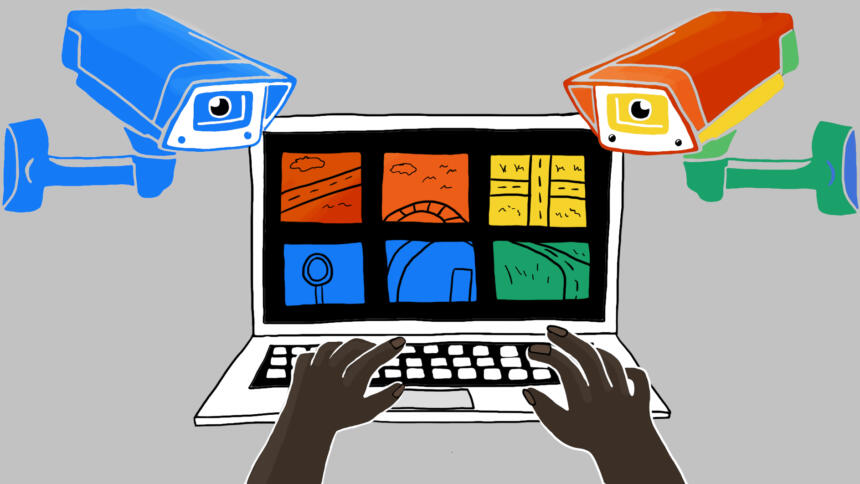Link to the German version. Link to part one of the series.
During the colonial era, the labor of the people from the colonies palayed the most vital role in the creation of wealth for the colonial powers. This wealth creation came at a huge human cost and exploitation. However, the people from the colonies were neither compensated for the exploitation they endured. Nor were they ever given their due acknowledgment for the vital role that they played in the creation of wealth for the west.
Today, as digitalization is disseminating jobs all over the Global South, we see something similar taking place.
How stupid cars get a little bit „intelligent“
Not a week goes by without news of some breakthroughs in Artificial Intelligence and how highly “intelligent” algorithms can perform the jobs which previously could only be done by humans. But for all the bombastic language often employed by IT companies, machines are hardly intelligent and cannot think for themselves. An untrained Machine Learning algorithm is „like a sports car without wheels: it may still look nice, but it won’t get you anywhere – it’s essentially useless,” writes the technology researcher Maximilian Gahntz. These machines require manually tagged images and human labor that „teaches“ artificial intelligence how to work.
However, when one thinks of machine learning and artificial intelligence, one rarely thinks of the role that Africa and the rest of the Global South plays.
Take Brenda, for example, a single mother living in Kibera, Africa’s largest urban slum. As reported by the BBC, she is working in a data labeling firm in Nairobi, Kenya, tagging people, cars, road signs, lane markings, and the skies in countless images. These tagged images are then ingested into artificial intelligence systems meant for self-driven cars so that these cars can recognize objects in real life.
Today, a lot of such work is increasingly being outsourced by western tech firms to countries in Sub-Saharan Africa and Southeast Asia, as these countries provide access to cheap labor. US firms such as Samasource, Mighty AI, Scale AI, and Amazon’s Mechanical Turk are some of the more prominent companies which outsource this work to these countries. These firms serve clients such as Facebook, Google, Microsoft, and Yahoo.
At the same time, the outsourcing of digital work in the Global South is inextricably linked to exploitive labor practices employed by foreign firms. The digital labor market in these regions is rampant with low wages, harsh working conditions, alienation, income disparity, racism, stress, and lack of global recognition.
Income disparity and work alienation
Sure enough, digital workers from the Global South earn only a tiny fraction of the profits generated by their labor power. For instance, Samasource, also known as Sama, which serves clients such as Google, Microsoft, Facebook, and Yahoo, made US$19 million dollars in 2019 – which in itself isn’t that much money when compared to what their major clients make every quarter. But the workers at Sama earned around just US $8 dollars a day. Though US $8 dollars may well be living wages in certain areas in the Global South, there remains a massive disparity between what these digital workers earn and what the western firms make in profits.
Most of these countries suffer from high poverty rates which provides large reserves of workers who would accept low-paying jobs. In Kenya, around 36% of its population lives below the international poverty line. In Uganda, another sub-Saharan tech hub, around 28% (out of a total of 44 million) of its total population is considered to be poor. In India, another major destination for work outsourcing, 68% out of more than 1.3 billion people live in poverty. The presence of large reserves of unemployed or poorly employed workers gives these firms an upper hand in dictating the terms of employment.
The exploitation doesn’t stop at low wages. Workers in the data labeling sector are subjected to “boring”, “repetitive” and “never-ending work”, as described by the BBC. They talk about “how they faced pressure to work quickly in order to hit company targets, leading to fewer breaks.” Even when some of them are freelancers working from home, they are under constant surveillance of a webcam that watches constantly. The demand to stay engaged for hours is leaving “a certain strain to eyes and body.”
A study conducted in the data labeling sector in five Sub-African countries found that the workers face high work alienation; in the sense that these workers are never told what the purpose or the end object of their work is. When asked why they are tagging the images, one worker responded, “They don’t tell me; they just want lots of images tagged”. Anwar and Graham, authors of this study, say that the workers “could not be more alienated” from their work as they are “building products that they are unlikely to ever see or use”.
Profits before people
Aside from providing digital labor for data labeling, the workers from several countries in the Global South are increasingly performing the infamously excruciating work of social media content moderation – the work which is often enough provided by the same companies from the west.
For instance, Sama operates in Nairobi which has lately become the hub where Facebook content moderation takes place for the Sub-Saharan African countries. At Sama’s office there, around 200 employees sit in front of computer screens where they must watch graphic videos of murders, rapes, suicides, and child sexual abuse on Facebook. Facebook has outsourced this work to these countries through companies like Sama. These workers act as sort of social media front-line workers where they watch such graphic content on Facebook and remove such content before it is seen by an average user.
However, for the brutal and “mentally traumatizing” work that these content moderators do, Sama used to pay some of them as little as $1.50 per hour until recently, according to a Time investigation. “The work that we do is a kind of mental torture,” said one employee, who currently works as a Facebook content moderator for Sama. “Whatever I am living on is hand-to-mouth. I can’t save a cent. Sometimes I feel I want to resign. But then I ask myself: what will my baby eat?”
The Sama employees also complain that the company does not allow them to take breaks. Overall, there is an environment of intimidation and suppression of the right to unionize. One Daniel Motaung, an employee at Sama, was fired from his job for trying to fill trade union papers. Sama accused him of taking action that would put the relationship between Sama and Facebook at “great risk”.
Digital colonialism and lucrativeness of the Global South labor market
These extractive practices are representative of the larger exploitive practices rampant in the work in the information and communication sector that is outsourced and undertaken in the countries in the Global South. The debate around the exploitation and profiting of the digital labor from the Global South is increasingly becoming part of the debate on digital colonialism. Scholars and activists are talking about the colonial era practices of labor exploitation that are being continued today which result in wealth disparities around the world.
Besides the seemingly endless supply of cheap labor, another phenomenon that is common to several countries in the Global South are the weak leabour laws. The weak labor regulations play a vital role in the lucrativeness of these countries as the destination market for digital labor. In fact, an expert in the South African Business outsourcing industry said that changes in labor regulations to encourage firms to offer permanent contracts to workers can hamper South African firms’ flexibility and competitiveness. Similar concerns have even been raised by digital workers themselves. Some of them claim that regulating the market and thereby bringing in stronger labor laws could result in jobs relocating to some other country.
But even if regulations do exist, the enforcement of existing rules is a different story altogether. In a recent letter, the aforementioned Daniel Motaung fired by Sama accused his former employer of breaking various Kenya laws, including accusations of unsafe and unfair working conditions. Presumably, a court will have to decide if these allegations are indeed true. But weak institutions, understaffed government agencies, and rampant corruption in some parts of the Global South are tilting the playing field further in favor of the rich companies.
Race to the bottom on a global scale
But at the end of the day, workers in the Global South face another and a bigger challenge. As the jobs are being disseminated all over the world because of increasing internet connectivity, the workers are today not just competing with one another at a local or a national level, but in fact at a global level. As a result of high poverty and unemployment, the workers have to settle for poor working conditions. This way, the workers are globally undercutting each other.
While the internet has been a liberating technology for some, it created new avenues for exploitation on a massive scale, exacerbating existing inequalities and creating new ones. As long as there isn’t a mechanism that could be termed as a global union for digital workers which would protect and represent their rights, these incentives will remain in place, continuing the race to the bottom. The absence of such a mechanism or other binding minimum standards of wages, allows the global firms to make use of structural inequalities in the Global South with much ease.
Digital Colonialism
This article is part of a series on Digital Colonialism. We will cover different issues pertaining to the dominance of digital space in the global south by a handful of powerful countries and major tech companies. Over the past several years, scholars and activists have been increasingly writing on how this handful of firms make use of digital technologies to create dominance which extends itself to socio-political and economic space undermining the sovereignty and local governance in countries of the global south.
These scholars term this phenomenon as digital colonialism. They argue, that while the mode, scale, and contexts may have changed, colonialism’s underlying function of empire building, value extraction, exploitation of the workforce, and appropriation, remain the same.
Link to the German version. Link to part one of the series.





0 Ergänzungen
Dieser Artikel ist älter als ein Jahr, daher sind die Ergänzungen geschlossen.